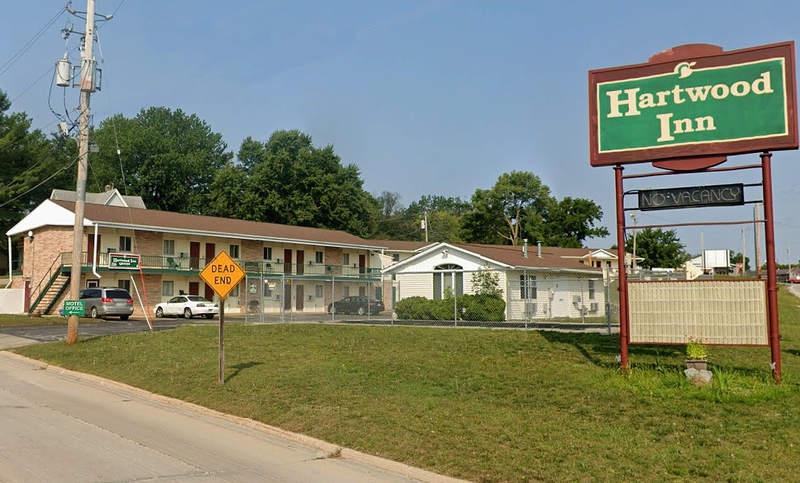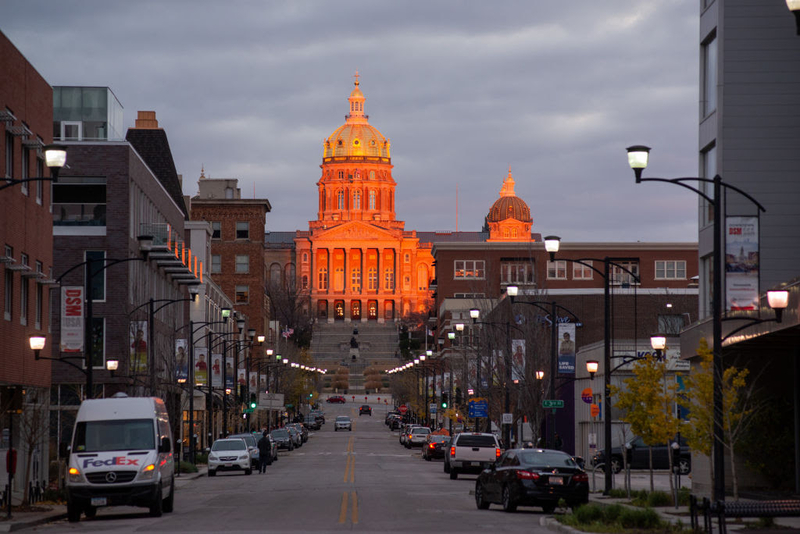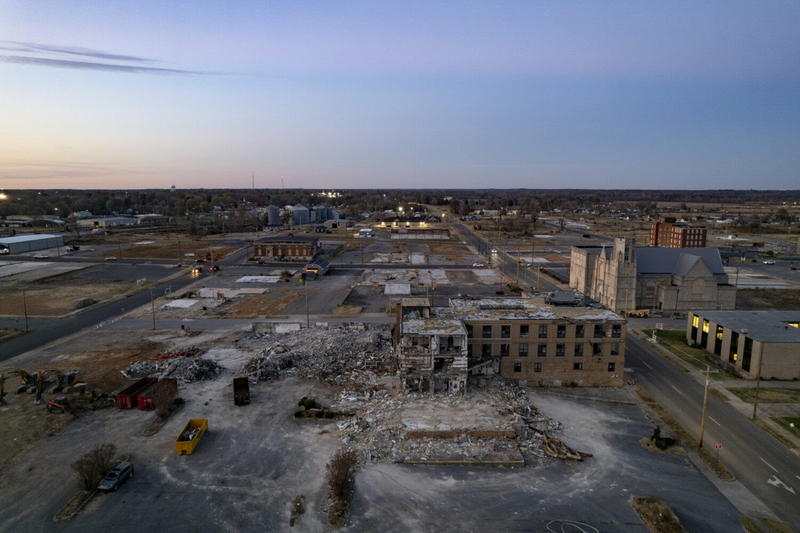The weird corners of government

The Hartwood Inn on Gilbert Street in Charles City has been operating for one year without a license, despite dozens of health and safety violations. (Photo via the Iowa Capital Dispatch)
I’m a big fan of finding offbeat angles in political coverage. It’s not that hard to find those stories — as we’ve discussed, government is weird — but it is hard to find time to write them, because there’s usually too much other stuff happening. Corruption rests for no reporter.
But occasionally, the stars align to give me an opportunity to showcase the lesser-known sides of government. And today, the stars (OK, our newsrooms) have given me some doozies.
The Big Takeaway
When you think of government or politics, you probably think about the people you vote for — your governor, or state legislator, or city council representative. But lawmakers are only the most visible (and loudest) part of the massive machine that is American government. The real work takes place behind the scenes, where thousands of employees keep the country running in a lot of ways you’ve probably never considered.
For a particularly unsettling set of examples, let’s head to Iowa, where Capital Dispatch reporter Clark Kauffman has spent months combing through state and local inspection reports to bring us a smorgasbord of horrific findings. Moldy taco meat and long-expired milk on shelves in grocery stores! Rodent droppings in restaurant buffets! Dirty operating rooms in hospitals! I am never leaving my house again!

The list got a lot longer after inspectors visited the Hartwood Inn. The 36-room hotel, located in Charles City, has been operating for a year without a license despite dozens of health and safety violations, each one more troubling than the last. Recent infractions range from “not having a single working smoke detector” to “someone literally died in this room and there’s blood and feces on the floor.”
Gilbert Starble, the hotel’s owner, told the Iowa Capital Dispatch that the violations are the result of his own “unwise choice” to offer the facility as a housing option during the pandemic to a slate of tenants he described as “homeless people, addicts, criminals, ex-convicts, recovering addicts and poor people.”
“It just didn’t work out,” he said.
Whatever the cause, those (many) failed inspections are preventing Starble from operating the Hartwood Inn as a licensed hotel. Separately, officials with Charles City have refused a proposal to use it as an apartment building. (Starble’s third proposed use — a dorm for a faith-based school that would teach “gospel music and [spread] the good news of Jesus Christ” — remains aspirational and similarly unlicensed.) Collectively, this would seem to render the building unusable, but Starble, apparently undaunted, has just continued to use it anyway, renting rooms to both short-term guests (like a hotel) and long-term stays (like an apartment building).
So far, he’s faced no consequences for it. None of the hotel’s dozens of violations included fines or penalties, and while both state and local officials seemed aware of the issue, neither had a clue what to do about it. A spokeswoman for the state Department of Inspections and Appeals said Tuesday she couldn’t say what the agency plans to do about the hotel, but would for sure have an answer on Wednesday. (It is Wednesday. I do not have an answer.) A city official punted the question back to the state, adding that he, personally, “wouldn’t put a guest in there” because the conditions are “just really bad.”

The tourism industry is suffering a more official blow in South Dakota after Gov. Kristi Noem banned state agencies from using TikTok, prompting the state Department of Tourism to delete its account. As of Tuesday, the agency had amassed 61,200 followers and 1.7 million likes, per the South Dakota Searchlight.
The ban, instituted via executive order, prohibits South Dakota agencies, employees and contractors from downloading or using the video-sharing app on devices that are owned or leased by the state. Noem, a Republican, said the move was a security precaution in response to recent FBI warnings that the app, owned by China-based firm ByteDance, could be used to influence Americans or control their devices. (ByteDance has denied those allegations.)
“South Dakota will have no part in the intelligence gathering operations of nations who hate us,” Noem said in a news release. “The Chinese Communist Party uses information that it gathers on TikTok to manipulate the American people, and they gather data off the devices that access the platform.”

Noem isn’t the first politician to turn on TikTok. Nebraska Gov. Pete Ricketts issued a similar executive order way back in 2020, and congressional Republicans have proposed at least two TikTok bans (one national, and one for government devices). A third proposal would prohibit the app from accessing Americans’ user data from within China. (Former President Donald Trump also threatened to ban it, but that idea, like most of his non-seditious plans, never materialized.)
Still, it’s a loss for state agencies, including the Department of Tourism, which regularly used TikTok to reach younger audiences. The agency had content-sharing partnerships with a handful of influencers, including TikTok star “Corn Kid,” who came to South Dakota in September to visit the World’s Only Corn Palace. Noem appeared with him there to bestow the title of official “Corn-bassador.” (By now, you certainly understand what I mean when I say that government is weird.)
A spokeswoman said that the tourism department would easily continue its outreach by using “an endless supply of other safe tools and productive resources … to tell South Dakota’s story.” But for other agencies, the alternatives were less clear. South Dakota is home to six public universities, most of them with multiple official TikTok accounts for athletics, academic departments and recruitment efforts.
“We do use TikTok quite a bit,” said Mike Lockrem, director of marketing and communications for South Dakota State University. “We’ll work with our general counsel in the next couple days to understand what this means before we make any decisions.”
The wonderful world of government: (Minnesota) Gov. Tim Walz solicits six-figure donations for inauguration committee … (Nebraska) Historic cabin, popular tourist stop remains closed, maybe for good … (Nevada) Cat lovers clobber CCSD trapping contract
Caught Our Eye

A big welcome to the Kentucky Lantern, the newest States Newsroom outlet! The Lantern made its debut on our national site with an in-depth story about the housing challenges that continue to plague survivors of a December 2021 tornado outbreak that decimated Mayfield, a 10,000-population town in Western Kentucky. Roughly 400 units were destroyed, most of them low-income rentals that have not been rebuilt. Rent prices soared as demand surged, leaving many displaced tenants without an affordable option. It’s a major stressor that exacerbates the trauma of the tornado itself, which still affects survivors on a daily basis.
“Everyone needs to be looking at the next couple of years for everybody that has been affected,” said Makayla Puckett, a 25-year-old mother of two who found transitional housing after her rental home was damaged. “Because it’s going to take that long to be able to recover from this, and I don’t think we’ll ever recover mentally from it.”
From the Newsrooms
- (New Jersey) Court declares churches’ battle against 2020 pandemic restrictions moot — again
- Albertsons-Kroger mega-deal raises questions from lawmakers about higher food prices
- (New Hampshire) With state aging rapidly, communities see opportunities to become more ‘age-friendly’
- ‘Reminiscent of fascism?’ Activists fear proposal could limit protests, chill speech at Florida Capitol
- More than 140 groups oppose effort to limit citizen changes to Ohio Constitution
One Last Thing
All hail the long and crusty goodness of the French baguette, which just received special protected status from UNESCO, the cultural body of the United Nations. As of Wednesday, the “artisanal know-how and culture of the baguette" is part of UNESCO’s list of Intangible Cultural Heritage, which means the bread (or at least the artisanship behind it) has been recognized as part of “intangible human culture.”

This edition of the Evening Wrap published on November 30, 2022. Subscribe here.


